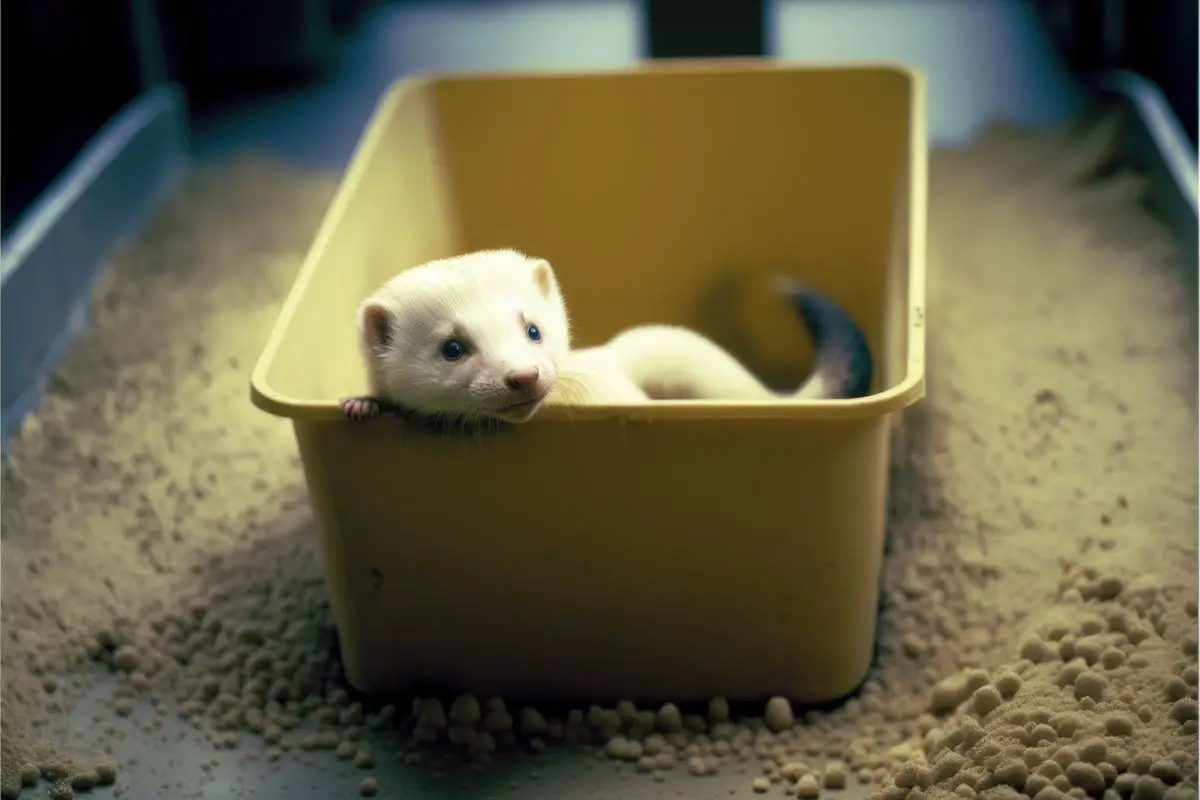The Ultimate Guide on Litter Box Training For Ferrets

We’ve heard this complaint time and time again from new ferret owners. Their frisky furballs tend to run off as soon as they see the litter box. Or they poop outside the litter box as if they know that it irritates their humans. Due to this, you end up cleaning their accidents in the nooks and crannies of the house.
If you can relate to this situation, then you’ll be happy to know that we’ve got a solution for you. We’ve rounded up our best tips for litter box training for ferrets. We’re confident that one of these nifty strategies will lead to positive results.
So without further ado, let’s learn how to litter train your ferret!
The Premises: Is Litter Box Training for Ferrets Possible?
That’s probably one of the first questions that pop in your head when you decide to take the furball home. Most pet shops tell you that it’s an easy task and that ferrets can get potty trained like their feline friends.
The thing they forget to mention is that it takes time, energy, and patience to train a ferret successfully. That’s because these curious creatures tend to explore the house and proclaim different spots to do their business. These spaces include the area beneath the stairs, under the bed, and any other corner they find.
Therefore, if you plan to litter box train your ferret, then you should come up with a game plan.
Here are a few strategies to stop ferrets from pooping outside the litter box:
- Block their entry in areas around the house where the ferret might relieve itself. You can place big boxes in those spaces or create bedding. So the ferret considers those areas as its living space instead of a place to relieve themselves.
- An alternative is to place multiple litter trays around the house (preferably its chosen spots).
- Spray bitter apple or pepper spray in these locations to deter the ferret.
Once you’ve figured out these strategies, you can commence the litter training session.
The Solution: Litter Box Training For Ferrets?
Every ferret is different, which is why you should try multiple training techniques on yours. Eventually, your clever companion will take the hint and learn how to use the litter box.
Here are the most effective strategies for your training sessions:
1. The Isolation Method
Whether you’ve got a kit or an adult ferret―litter box training should begin inside the cage. That’s because it’s the safest and most accessible option for them.
You should confine your pet inside the cage whenever you are out and only take them out during playtime. In this way, your ferret will have to relieve themselves inside the cage. Once they have picked a place, you should place the litter box in that location.
The odds are that the ferret will start using the litter box to answer the call of nature.
You should stick to this routine until the ferret understands that they should eliminate their excrements inside the litter box.
Pro tip: Ferrets don’t relieve themselves in the same place as their bedding or play area. It’s why you should get a cage big enough to designate a litter area.
2. The Clues
What if your ferret keeps pooping outside the litter box?
Unlike cats, ferrets won’t choose the litter box as their potty place. You have to teach them to do this by preventing other alternatives to do their business. Additionally, you should coax them into using the litter box by providing them subtle hints.
Here are a few that may work for your ferret:
- Follow the Scent
If your ferret isn’t keen on using the litter box, you should mark that territory for them. Put their feces inside the litter box. The familiar odor could lead them to do their job on that spot.
- Clockwork
Most ferrets empty their bladder first thing in the morning. You should place your sleepy pet in the litter box as soon as they wake up. Follow a similar strategy for other times in the day where it looks like they are going to have an accident.
Ferret instinctively start walking backward, raise their tails, or squirm when they want to relieve themselves. You can use these telltale signs as a clue to shift them to the litter box.
Eventually, this routine will become a habit, and they will get used to the idea of using a litter box.
3. Positive Reinforcement Method
Lastly, use the ferret’s love for treats and praises as your trump card during litter training. So whenever your ferret uses the litter box correctly, you should reward them. These could be anything from praises, affectionate pats to small treats.
The positive reinforcement will encourage them to repeat this action. Soon enough, your pet will associate this practice with rewards.
What Else Should You Consider?
Other than these techniques, you should follow some simple rules to efficiently litter train your ferret. We call these rules, the three C’s for litter box training your ferrets.
Here’s what you should do:
- calm and Collected
You should approach litter training with patience. Any agitation on your part will scare off your furry friend. They are also more likely to disobey you if you respond to their accidents harshly.
- Consistency
Don’t expect the ferrets to get litter trained overnight. You have to consistently teach them the same lesson until using the litter box becomes a habit.
- Cleanliness
Make sure to immediately clean their messes if they poop/pee around the house. The place should be thoroughly cleaned and deodorized to stop them from coming back to that area.
In short, take precautionary measures to ensure that everything goes smoothly during the training process.
Frequently Asked Questions on Litter Box Training for Ferrets
You’ll probably face a few hurdles when you start the litter training period. We decided to address a few common problems to help you out.
Let’s have a look:
1. What Kind of Litter Box Should You Get?
In our experience, the size and scent of your litter box could make or break the training sessions. It’s why you should get the right one from the get-go.
To find the ideal litter box, you should ask the following questions:
- Will your ferret fit inside the litter box?
- Does it give easy access to your pet?
- Is the litter box odorless?






